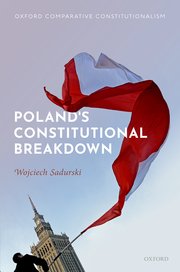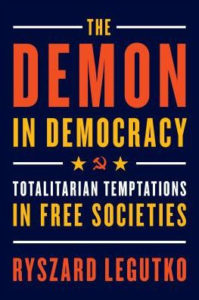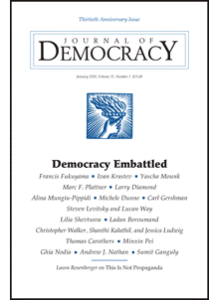 Following four-plus years of assault by the ruling Law and Justice (PiS) party, the embattled Polish judiciary may be on its last legs. On 4 February, amid mass domestic and international protest, Polish president Andrzej Duda signed into law a deeply-controversial set of new reforms openly defying the authority of the EU’s top court and seeking to prevent Polish judges from applying EU law under penalty of suspension, fines, salary cuts and dismissal, note analysts ELENA CRESPI AND JOSHUA RATLIFF.
Following four-plus years of assault by the ruling Law and Justice (PiS) party, the embattled Polish judiciary may be on its last legs. On 4 February, amid mass domestic and international protest, Polish president Andrzej Duda signed into law a deeply-controversial set of new reforms openly defying the authority of the EU’s top court and seeking to prevent Polish judges from applying EU law under penalty of suspension, fines, salary cuts and dismissal, note analysts ELENA CRESPI AND JOSHUA RATLIFF.
The power consolidation strategy pursued by the Law and Justice government since it came to power in 2015 has taken repeated aim at judicial restraints on the government’s ability to act, and represents at its core an effort to dismantle the very checks and balances that characterize democratic forms of government, they write for the EU Observer:
Modelled in many respects on the same blueprint for democratic decline followed in Hungary by strongman Viktor Orbán and his ruling Fidesz party – which, within less than a decade, has managed to overturn the fundamental tenets of European constitutional order and supersede them with the political oxymoron dubbed ‘illiberal democracy’ – the government in Poland has sought to fuse the ruling party and the state.
But some conservative observers insists that the ruling Law and Justice party is not seeking to undermine democracy but to challenge liberal orthodoxy.

National Endowment for Democracy
Liberalism has come to have two faces, argues Ryszard Legutko, a philosophy professor at Kraków’s Jagiellonian University:
- The first face is a specific political and philosophical doctrine. You can read John Locke, for example, or Benjamin Constant, or John Stuart Mill. Their visions of man in society entail a variety of presuppositions, and like any other theoretical conception, they may become objects of criticism.
- The second face is that of a super-theory, a comprehensive and obligatory way of thinking that is enforced in modern society as the best regulator of human diversity and the only sure guarantee of freedom. … Karl Popper set up this all-or-nothing choice in The Open Society and Its Enemies. Isaiah Berlin implies the same in his widely read essay, “Two Concepts of Liberty.”
These two faces—one proposing a set of political ideas, the other insisting that because of its unique inclusiveness and openness, only liberalism can be the basis for a just society—have fused, he writes for First Things. Liberalism as a specific political doctrine, one of many, identifies itself with liberalism as a super-theory and imposes itself on modern society as obligatory and above discussion.
 Individual freedom cannot be wholly determined by and immersed in the dogmas and presuppositions of the reigning political ideology, whether monarchic, socialist, liberal, or democratic, Legutko argues. Liberalism and its development into a super-theory make it difficult for human beings to attain such a perspective. Two factors are at work:
Individual freedom cannot be wholly determined by and immersed in the dogmas and presuppositions of the reigning political ideology, whether monarchic, socialist, liberal, or democratic, Legutko argues. Liberalism and its development into a super-theory make it difficult for human beings to attain such a perspective. Two factors are at work:
- On the one hand, liberalism addresses people as individuals. It tells each person that he has rights and that insofar as liberalism reigns supreme, he will be free to become whoever and whatever he wants.
- On the other hand, liberalism is a political construction that promises to secure individual rights only on condition that people adhere to its increasingly intrusive regulations and, more importantly, embrace the entirety of its ideology concerning right and wrong, what to love and whom to hate.
The combination of these two elements, plus the general thoughtlessness of liberal society, creates a mental trap, Legutko insists: The more one sees one’s independence in liberal terms, the more one succumbs to ideological conformity; the more one thinks of oneself as a master bearing innumerable rights, the more one resembles the Aristotelian slave.
Some observers have insisted that conservative critics of liberal democracy like Legutko seek the restoration of “essentially majoritarian democracy resting on constitutional liberal guarantees of free speech, free association, free media, and other liberties,” notes Marc F. Plattner, the founding coeditor of the Journal of Democracy and the cochair of the Research Council of the National Endowment for Democracy’s International Forum for Democractic Studies.
 But there is “no evidence” in his recent book, The Demon in Democracy: Totalitarian Temptations in Free Societies, that Legutko himself sees his aim to be that of restoring liberal democracy to the healthier condition that it enjoyed in previous centuries,” he wrote for The Journal of Democracy. “I think he wants it to be superseded by other kinds of governments and societies, presumably including those that PiS and its leader Jarosław Kaczyñski are trying to build in Poland.”
But there is “no evidence” in his recent book, The Demon in Democracy: Totalitarian Temptations in Free Societies, that Legutko himself sees his aim to be that of restoring liberal democracy to the healthier condition that it enjoyed in previous centuries,” he wrote for The Journal of Democracy. “I think he wants it to be superseded by other kinds of governments and societies, presumably including those that PiS and its leader Jarosław Kaczyñski are trying to build in Poland.”
While liberalism is frequently linked to democracy and capitalism, its precise relationship with them is nonetheless not obvious; liberals have not always been democrats and probably need not be capitalists, notes Daniel Luban, a junior research fellow in politics at Oxford University.
Liberalism can equally refer to a set of political principles (freedom and equality, for instance, or individual rights) or to a certain political style (conciliatory and consensus-driven, or gradualist and anti-utopian). There may be a broad affinity between the principles and the style, but they don’t always go together, he writes for Dissent.
indeed, the starkest alternative to liberalism currently on offer is not democracy, or socialism, or communitarianism—all of whose tensions with liberalism, however real, are likely not irreconcilable—but an authoritarian capitalism that is equally opposed to all of these possibilities, Luban contends.







